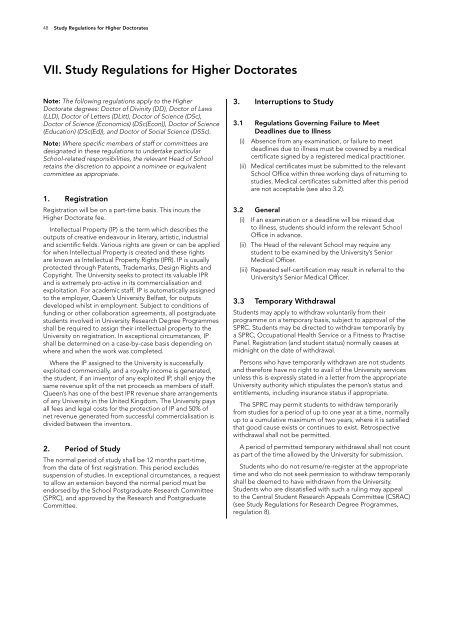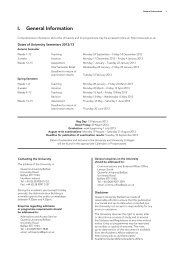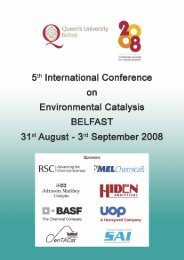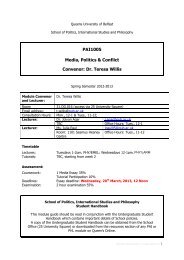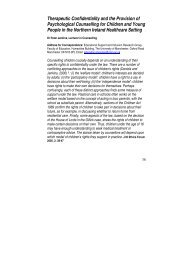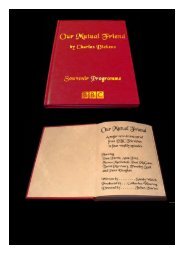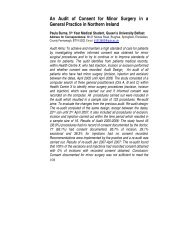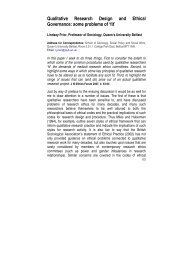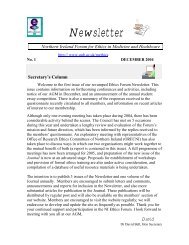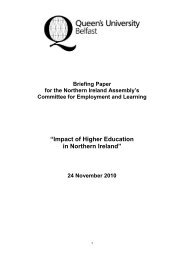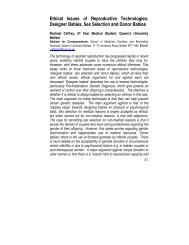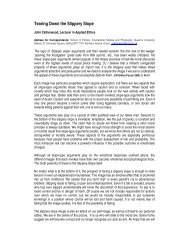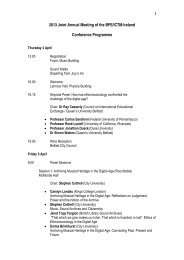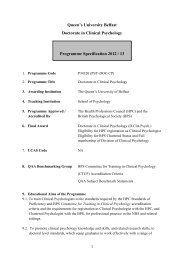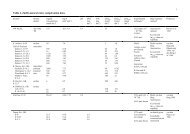University Calendar for Postgraduate Students 2012/13 - Queen's ...
University Calendar for Postgraduate Students 2012/13 - Queen's ...
University Calendar for Postgraduate Students 2012/13 - Queen's ...
You also want an ePaper? Increase the reach of your titles
YUMPU automatically turns print PDFs into web optimized ePapers that Google loves.
48 Study Regulations <strong>for</strong> Higher Doctorates<br />
VII. Study Regulations <strong>for</strong> Higher Doctorates<br />
Note: The following regulations apply to the Higher<br />
Doctorate degrees: Doctor of Divinity (DD), Doctor of Laws<br />
(LLD), Doctor of Letters (DLitt), Doctor of Science (DSc),<br />
Doctor of Science (Economics) (DSc(Econ)), Doctor of Science<br />
(Education) (DSc(Ed)), and Doctor of Social Science (DSSc).<br />
Note: Where specific members of staff or committees are<br />
designated in these regulations to undertake particular<br />
School-related responsibilities, the relevant Head of School<br />
retains the discretion to appoint a nominee or equivalent<br />
committee as appropriate.<br />
1. Registration<br />
Registration will be on a part-time basis. This incurs the<br />
Higher Doctorate fee.<br />
Intellectual Property (IP) is the term which describes the<br />
outputs of creative endeavour in literary, artistic, industrial<br />
and scientific fields. Various rights are given or can be applied<br />
<strong>for</strong> when Intellectual Property is created and these rights<br />
are known as Intellectual Property Rights (IPR). IP is usually<br />
protected through Patents, Trademarks, Design Rights and<br />
Copyright. The <strong>University</strong> seeks to protect its valuable IPR<br />
and is extremely pro-active in its commercialisation and<br />
exploitation. For academic staff, IP is automatically assigned<br />
to the employer, Queen’s <strong>University</strong> Belfast, <strong>for</strong> outputs<br />
developed whilst in employment. Subject to conditions of<br />
funding or other collaboration agreements, all postgraduate<br />
students involved in <strong>University</strong> Research Degree Programmes<br />
shall be required to assign their intellectual property to the<br />
<strong>University</strong> on registration. In exceptional circumstances, IP<br />
shall be determined on a case-by-case basis depending on<br />
where and when the work was completed.<br />
Where the IP assigned to the <strong>University</strong> is successfully<br />
exploited commercially, and a royalty income is generated,<br />
the student, if an inventor of any exploited IP, shall enjoy the<br />
same revenue split of the net proceeds as members of staff.<br />
Queen’s has one of the best IPR revenue share arrangements<br />
of any <strong>University</strong> in the United Kingdom. The <strong>University</strong> pays<br />
all fees and legal costs <strong>for</strong> the protection of IP and 50% of<br />
net revenue generated from successful commercialisation is<br />
divided between the inventors.<br />
2. Period of Study<br />
The normal period of study shall be 12 months part-time,<br />
from the date of first registration. This period excludes<br />
suspension of studies. In exceptional circumstances, a request<br />
to allow an extension beyond the normal period must be<br />
endorsed by the School <strong>Postgraduate</strong> Research Committee<br />
(SPRC), and approved by the Research and <strong>Postgraduate</strong><br />
Committee.<br />
3. Interruptions to Study<br />
3.1 Regulations Governing Failure to Meet<br />
Deadlines due to Illness<br />
(i) Absence from any examination, or failure to meet<br />
deadlines due to illness must be covered by a medical<br />
certificate signed by a registered medical practitioner.<br />
(ii) Medical certificates must be submitted to the relevant<br />
School Office within three working days of returning to<br />
studies. Medical certificates submitted after this period<br />
are not acceptable (see also 3.2).<br />
3.2 General<br />
(i) If an examination or a deadline will be missed due<br />
to illness, students should in<strong>for</strong>m the relevant School<br />
Office in advance.<br />
(ii) The Head of the relevant School may require any<br />
student to be examined by the <strong>University</strong>’s Senior<br />
Medical Officer.<br />
(iii) Repeated self-certification may result in referral to the<br />
<strong>University</strong>’s Senior Medical Officer.<br />
3.3 Temporary Withdrawal<br />
<strong>Students</strong> may apply to withdraw voluntarily from their<br />
programme on a temporary basis, subject to approval of the<br />
SPRC. <strong>Students</strong> may be directed to withdraw temporarily by<br />
a SPRC, Occupational Health Service or a Fitness to Practise<br />
Panel. Registration (and student status) normally ceases at<br />
midnight on the date of withdrawal.<br />
Persons who have temporarily withdrawn are not students<br />
and there<strong>for</strong>e have no right to avail of the <strong>University</strong> services<br />
unless this is expressly stated in a letter from the appropriate<br />
<strong>University</strong> authority which stipulates the person’s status and<br />
entitlements, including insurance status if appropriate.<br />
The SPRC may permit students to withdraw temporarily<br />
from studies <strong>for</strong> a period of up to one year at a time, normally<br />
up to a cumulative maximum of two years, where it is satisfied<br />
that good cause exists or continues to exist. Retrospective<br />
withdrawal shall not be permitted.<br />
A period of permitted temporary withdrawal shall not count<br />
as part of the time allowed by the <strong>University</strong> <strong>for</strong> submission.<br />
<strong>Students</strong> who do not resume/re-register at the appropriate<br />
time and who do not seek permission to withdraw temporarily<br />
shall be deemed to have withdrawn from the <strong>University</strong>.<br />
<strong>Students</strong> who are dissatisfied with such a ruling may appeal<br />
to the Central Student Research Appeals Committee (CSRAC)<br />
(see Study Regulations <strong>for</strong> Research Degree Programmes,<br />
regulation 8).


